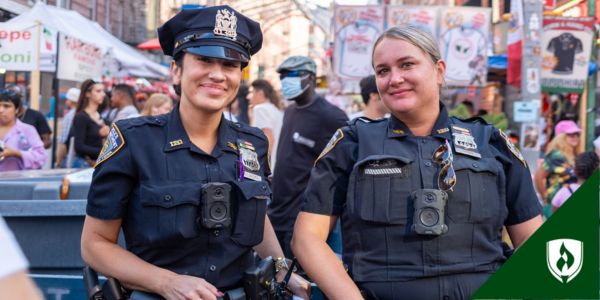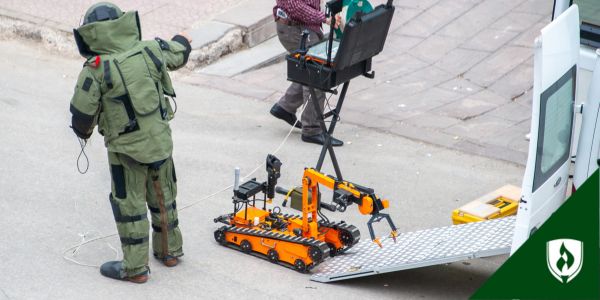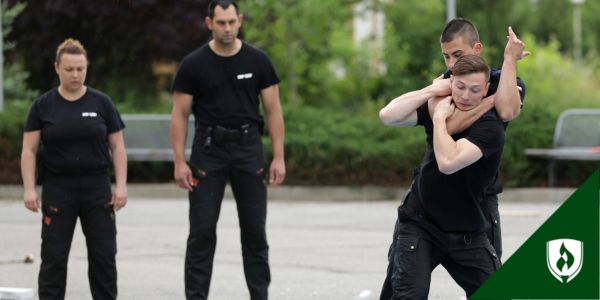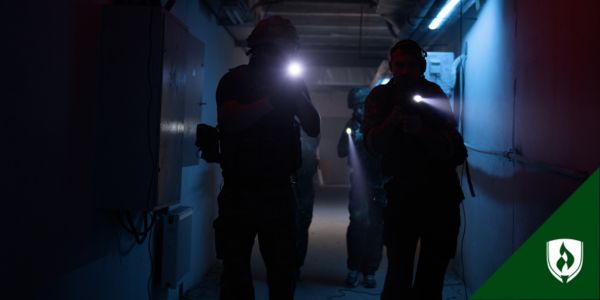How to Prepare for the Police Academy in Minnesota: 11 Ways to Get Ready
By Brianna Flavin on 06/14/2024
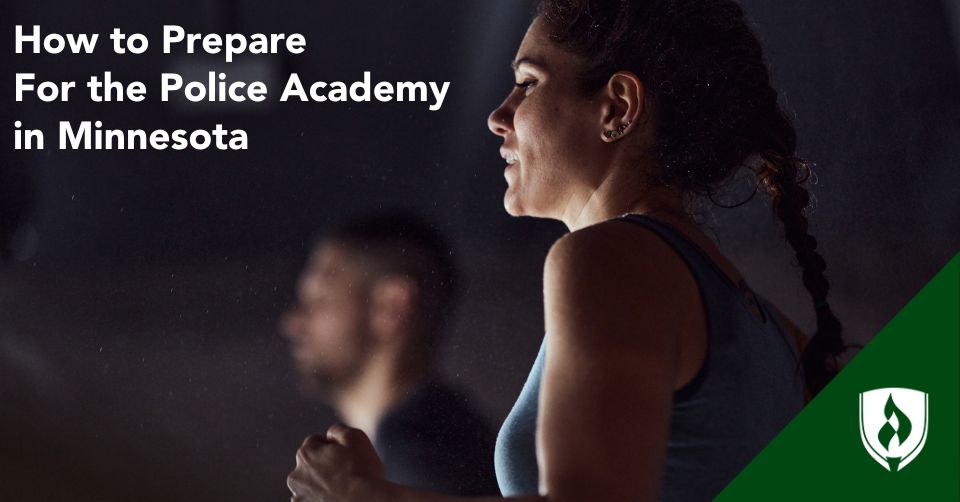
If you are considering a career as a police officer, the police academy is probably already on your radar. And you might already know that police academy requirements differ from state to state—and even between different police departments.
This can make it hard to prepare for police academy training. What can you expect? What will be expected of you?
In Minnesota, law enforcement students need to complete a skills academy before they can take the MN POST licensing exam. And they must pass the exam before they are eligible to be hired by a police department. After getting hired, police officers might take another training academy specific to the department they are working for—or they might get their training in the field.
While there will absolutely be differences (even meaningful differences) depending on where you attend your police academy, all police academies have the same goal—to produce confident, careful police officers who can help keep the public safe.
As you can guess, this goes beyond how many sit ups you can do.
If law enforcement in Minnesota might be part of your future, read on! This guide can help you understand what to expect from your training. We asked police academy instructors and graduates to share details about preparing for the police academy.
Rasmussen University’s Law Enforcement Associate’s degree program and Law Enforcement Certificate program are only aligned with the standards of MN POST and are not intended to satisfy professional licensure requirements of professional licensing agencies in any other state.
Ready to become a Minnesota Police Officer?
Learn more about Rasmussen University's Law Enforcement Associate's Degree programPhysical preparation...
A career as a police officer has lots of physical requirements. Depending on where your career takes you, you might need the muscle memory to use a weapon with accuracy, engage in running pursuit or rescue someone.
Push ups and sit ups are an important part of that physical fitness training, along with excellent cardio. These elements will most likely appear in your physical fitness test.
"There are physical fitness requirements in all states—and, yes, they may differ, but only slightly," says Eileen Carlin, Assistant Professor of Justice Studies at Rasmussen.
She says that no matter where you attend the police academy, all officers are required to have the ability to run, jump fences, and physically defend themselves and their weapons if they are physically attacked. Getting into peak physical condition will make your time in the academy easier.
1. Get in cardiovascular shape
"The first part of the day is spent in physical fitness which involves running at least 6 miles," Carlin says, referencing the schedule from her police academy. If you want to be prepared for the physical fitness component of your police academy, working on your cardio is an important place to begin.
"I would have definitely run and trained more leading up to the academy," says Rebecca Modeen, officer with the Saint Paul Police Department and graduate of the Rasmussen Law Enforcement program.
"We ran about 20-25 miles a week at times during the academy, and it was very high-intensity," she explains. "Preparing more for that would have helped me focus on other things."
2. Work on your calisthenics
At her police academy, the hour after running was dedicated to calisthenic training, Carlin says. "That involves sit-ups, push-ups, pull ups, etc…Once, I counted 800 sit-ups that we did in one sitting!"
Working through exercises that focus on using your own body weight are an ideal way to start.
3. Practice elements of hand to hand
Most police academies have a requirement around hand to hand combat, according to Carlin. This includes learning to fight with your fists and learning how to protect your weapon if you are attacked.
If you enjoy martial arts, boxing or grappling, spending some time working on those movements might be helpful.
4. Plan on some discomfort and duress
In the police academy, you'll likely be on the receiving end of a taser and/or pepper spray at some point. When Carlin attended the academy, recruits needed to be sprayed with pepper spray before they could graduate. In some places, the requirement also now includes tasing.
These elements were part of the distractions thrown at recruits during a response scenario, in Modeen's police academy training.
"We needed to address suspects and continue navigating through situations after experiencing things like pepper spray and other exposures—which are very distracting," Modeen laughs.
"The pepper spray was not fun," Carlin agrees.
"But, it is a great experience to have because we were able to see that we could fight through an inconvenience in order to continue the mission," Modeen says.
5. Prioritize great nutrition
If your diet is light on nutrients, you will really feel that when the physical training in your academy starts. Take this moment as the right time to start prioritizing your health.
Police officers work long hours—10 to 12 hour shifts, according to Carlin. "In order to stay physically fit, officers need to understand the importance that exercise and a good diet have." She adds that your health is not just about health when you become a police officer. It's also about being able to defend yourself or help others.
We could all use better hydration, so keep that in mind. Then, look for sustainable ways to add more nutrients to your meals.
6. *Don't* practice emergency vehicle operations until the academy
In law enforcement, you might drive a variety of emergency vehicles. This takes special training and is part of the police academy—it's not something to practice on your own. But knowing what to expect is helpful.
"Police cars are normally larger and much heavier than personal vehicles, yet officers must be able to do a U-turn in one step (you're not permitted to back up and try again)," Carlin says. "You need to be able to turn that car around in one swoop without hitting anything."
On top of that, Carlin says recruits need to practice driving super fast in these vehicles, which is very difficult. You need to navigate an obstacle course of cones and turn on a dime without flipping the car to demonstrate precision.
"They also have superior officers sit in the car with you while you are doing these tests," Carlin says. "That alone is intimidating."
Mental preparation...
The academic aspects of the academy are no less important than the physical training. You will likely have a solid foundation of writing practice and legal knowledge from any law enforcement degree program you've completed. The academy will build on that, according to Carlin.
You'll work with prospective fellow officers to memorize laws, study and pass tests.
7. Study law
Learn as much as you can about the laws in your state. Criminal law, national laws, regional and local laws can all be relevant areas to read up on.
Hold on to the materials you receive through your law enforcement program and keep them organized. You never know when you'll want to reference something again.
8. Study local geography
"I wish I had more time to study geography," Modeen says. "Really no matter what city you are in, geography is essential as a law enforcement officer." In her work for the SPPD, she says knowing her cardinal directions at all times has been huge.
"No matter what, when you are on a call, you can radio your location, what direction you are going, etc..." Modeen says. "It's imperative."
9. Practice your writing
Writing is a huge part of any career in law enforcement or criminal justice. If you're drawn to law enforcement, you probably like hands-on work. But neglecting your writing would be a big mistake.
The first way to get great practice in the kind of writing you'll need at the academy is through a law enforcement program. But after that, hold yourself to a high standard of grammar and fluency every time you write. You'll be glad you did when the academy starts.
10. Work on your active listening
Many people don't realize how much police officers need to interact with the public. It's not just about moments of confrontation, traffic stops or arrests. It's also responding to calls for help, de-escalating arguments and disputes, and having people's eyes on you at all times.
If you pursue this career, you need to make sure you are representing your department well and giving the public more reasons to trust what you do.
Practice active listening, letting others speak first and making sure you understand what they're saying and not saying. Practice noticing body language and being aware of how your presence affects people. Read up on techniques in community policing, and practice strategies with your friends and loved ones.
11. Prepare to connect with people
Police officers are liaisons to their communities. The more connections and relationships you can build between your department and the areas you serve, the better your work will be.
On top of that, connecting with fellow officers is an important way to build a sense of trust and safety on the job. The other recruits in your academy will be people who also hope to work in your area—they can be a vital network of support, camaraderie and increased resilience.
"Meeting people who were just as motivated as I was in law enforcement was one of the most surprising parts of the police academy," Modeen says. "I've done lots of different training, including for basic training for military service, and I have not yet found a group that was as serious or motivated as my classmates."
Take advantage of your time in the academy to make new connections.
Build your law enforcement career one step at a time
Going through the police academy takes serious work and dedication, but it comes with benefits. "Although it was stressful going through the academy, I came out in the best physical shape of my life," Carlin says. "And I never lost the motivation to run every day and maintain my fitness."
You will meet amazing people who have the same desire to help their communities, and you'll have a solid foundation of skill and confidence to begin working with a police department.
"Your career in law enforcement is entirely a marathon, not a sprint," Modeen says. "Continue to try, and you will continue to be successful."
The first step into law enforcement is education. At Rasmussen University you will be able to train to become a Minnesota police officer. A Law Enforcement Associate’s degree can be completed in as few as 18 months1. Get more important details about tuition, timing and what to expect in your courses at our Law Enforcement Degree page.
Start your journey to a law enforcement career.
Explore Rasmussen University's Law Enforcement programsOr read up on how to prepare for the law enforcement licensing exam in Minnesota.
The Law Enforcement Associate’s degree program is not aligned to the standards of any professional licensing body other than the MN POST and does not satisfy professional licensure requirements of any professional licensing agency in any other state. It is important to check the requirements needed to become a law enforcement officer in your state of residence.
1Completion time is dependent on the number of transfer credits accepted and the number of courses completed each term.

